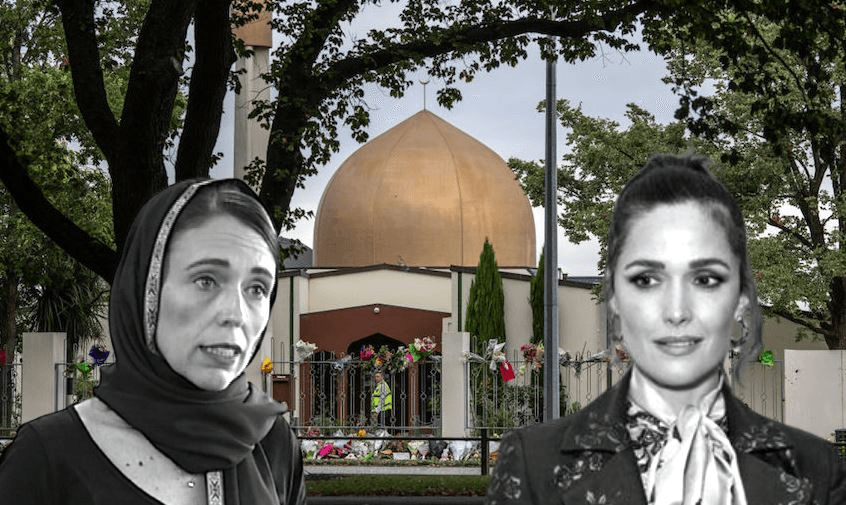A film on the Christchurch mosque attacks that has Jacinda at its centre is not the film the moment demands. The director and producers have the skills to make the right movie. The question is whether or not they have the courage to do it, writes Anjum Rahman.
Rose Byrne looks a lot like Jacinda Ardern, and she’s a lovely woman. I’m sure she would portray the prime minister exceptionally well, and an Australian accent is not too far from a New Zealand one. But is the March 15 tragedy the PM’s story? There is no doubt that she played a critical leadership role in the government’s response, and in framing the reaction on behalf of our country.
Fifty-one people died, 50 were injured. There were hundreds present at the two mosques. These were worshippers, standing unarmed and defenceless as they were slaughtered in an act of supreme hate. An act by a self-described ethno-fascist, the “ethno” part of that description being an open white supremacist ideology.
These people were killed because of their faith and their race. By a killer who couldn’t bear to be served by people of colour, and took his mother and her partner to another café where they could be served by white people.
The questions have to be asked: are Muslims not able to engender enough compassion and empathy to be the central part of a movie about this tragedy? Is a movie that captures our pain, our courage, our ability to stand up to the face of terror and hate with dignity and strength not a tale that will sell? Are we not inspiring enough?
Kiwi director Andrew Niccol likely came up with this angle, and thought the story of Ardern should be told with the tragedy as a backdrop. FilmNation’s Glenn Basner, apparently “shopping the story to international buyers”, says the film is about the positive impact of a compassionate leader.
Neither of them has a soundbite that talks about white supremacist terrorism. That’s clearly not positive enough. It’s not the story they want to shop. It’s not the story they think will attract the funding they need.
They know the industry, they know what sells. Niccol has been a writer for films like In Time and The Truman Show – the latter was a life-changing film for me. He’s very good at what he does.
With this expertise and experience, after consultations with members of the affected mosques, with producer Ayman Jamal and New Zealander Philippa Campbell, this is the movie they think will move audiences enough to watch. Perhaps they believe that the reality of what happened was too harrowing, that people won’t come to watch that kind of horror and pain. Maybe they think people don’t want to face the full reality of what transpired in those two mosques.
The evidence says otherwise. Twelve Years a Slave did “surprisingly” well, based on a true story that depicted the horrors of slavery with accuracy. It’s hardly a surprise that audiences have supported a film featuring people of colour, when it is well made and marketed. The Pianist is a film that reflects the reality and horrors of the Holocaust, centring those who were harmed, and receiving critical acclaim.
The story of this tragedy must be told in film. There is much to be brought to public attention around the demonisation of a community, the rise of white supremacy, the impact of viral disinformation campaigns, and how these led to the kind of radicalisation where 51 people lost their lives in a meticulous planned act of cold-blooded execution.
There is also a story to be told of victims who held in their rage, who responded to hate without fuelling more of it. The story of a Muslim community who loved our country and who worked consistently to protect it as best we could, from the leadership to the grass roots, while at the same holding our government to account and asking the difficult questions.
There is the story of hundreds of thousands of New Zealanders streaming to their local mosques to show their support and to grieve together with the Muslim community. And in amongst that is the story of our PM who stood up and delivered what was needed in the midst of this awful tragedy.
That story is compelling, it’s inspiring and necessary. White supremacy is still at our door, harming our young people, threatening tangata whenua, pervasive in our online spaces and political discourse. A film that motivates people to act against this real and present threat is nothing if not urgent.
The director and producers have the skills to make such a movie, the question is whether or not they have the courage to do it. They need to be willing to take the time to do it right, which means consulting widely and spending time with those affected, to honour their experiences.
Most of all, they need to recognise that this is not their story to turn for a profit, nor to interpret in a way that best suits their needs. I have and will continue to be vocal about the fact that profits should be reinvested into the affected families and in community-based counter-terrorism measures.
If you can do all of that, our country will stand with you. If you can’t, please move aside and spend your time on something else. Leave this story for those who will do it justice.
